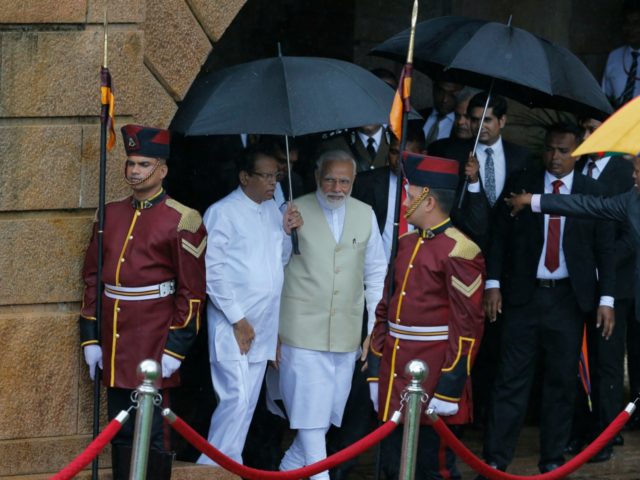Indian Prime Minister Narendra Modi became the first head of state to visit Sri Lanka since the devastating Easter Islamic State attacks, making an unexpected stop Sunday at St. Anthony’s Shrine in Kochchikade to honor those killed.
Modi’s visit and solidarity with Sri Lanka’s Christian community were especially surprising given the rise in Hindu nationalist violence, and police permissiveness toward it, against Christians during his rule in India. Incidents of mob attacks, forced conversions, and other violence against Christians has skyrocketed in the country under Modi’s Bharatiya Janata Party (BJP).
The Islamic State claimed six bombings throughout the Colombo, Sri Lanka, metropolitan area on Easter, targeting three churches and three hotels catering to Christians celebrating the holiday. The bombings killed over 250 people. In St. Anthony’s and the other churches, witnesses said the suicide bombers detonated their explosives towards the back of the church to ensure that the death toll would include more children, as parents tend to sit or stand closer to the exits.
Modi published a video of his visit to the church on Twitter, offering flowers to the victims. “I am confident Sri Lanka will rise again,” he wrote. “Cowardly acts of terror cannot defeat the spirit of Sri Lanka. India stands in solidarity with the people of Sri Lanka.”
Started the Sri Lanka visit by paying my respect at one of the sites of the horrific Easter Sunday Attack, St. Anthony’s Shrine, Kochchikade.
My heart goes out to the families of the victims and the injured. pic.twitter.com/RTdmNGcDyg
— Narendra Modi (@narendramodi) June 9, 2019
Modi became the first foreign head of state to visit Sri Lanka since the attacks.
“With his visit, the Prime Minister will be hoping to send a strong message to the international community regarding the normalcy regained in the current security situation in Sri Lanka. This could have a substantial positive impact on the foreign tourist inflows into Sri Lanka, and on the Sri Lankan economy at large,” Sri Lanka’s Daily Mirror suggested. The newspaper highlighted the fact that Modi became the first Indian prime minister to visit the island nation in 28 years with his first visit in 2015 and has made bilateral ties a priority.
Modi’s visit to Sri Lanka included discussions with senior officials on how to prevent similar jihadist activity, according to the Agence France-Presse (AFP). Modi met with both Prime Minister Ranil Wickremesinghe and President Maithripala Sirisena, who run the legislative and executive branches, respectively, and have been engaged in a power struggle some blame for the Sri Lankan government failing to prevent the bombings.
Wickremesinghe’s cabinet revealed shortly after the attacks that Sirisena’s cabinet had kept them from attending intelligence briefings since Sirisena tried, and failed, to unconstitutionally replace Wickremesinghe late last year. During that time, the government of India reportedly warned Colombo that a jihadist group was organizing a targeted attack against Christians for Easter Sunday, but there is no evidence that the Sri Lankan government did anything to prevent the attack following that tip. Sirisena has repeatedly denied having any previous intelligence that would indicate that an attack was on the way.
Rumors also surfaced in the aftermath of the attacks that Zahran Hashim, the believed mastermind of the attacks who appeared in a video pledging allegiance to the Islamic State shortly after the bombings, had spent years in India making videos of violent Islamist sermons and uploading them to Youtube. The Indian government denied any hard evidence on this conclusion, however, saying it was looking into the allegations and calling them “speculative.”
A legislative special committee to investigate the attacks handed its final report to President Sirisena on Monday morning.
State Intelligence Service (SIS) Sisira Mendis told the committee during the first hearing prior to the report’s publishing, made public last month, that the government indeed did have knowledge of an attack plot against Christians in the country. Sri Lanka is a majority Buddhist nation with significant Muslim, Hindu, and Christian minorities.
India sent a delegation of intelligence officials to testify last week.
Modi’s gesture of solidarity with the Christian community follows years of mounting criticism over the persecution Christians face in India, one of the first lands outside of the Middle East to embrace the faith. According to the United States Commission on International Religious Freedom (USCIRF), India is currently experiencing a “downward trend” in religious freedom as mob attacks on Christians increase in number and go unpunished.
In its 2019 report, the USCIRF blamed “the government’s allowance and encouragement of mob violence against religious minorities” for making India a more dangerous place for non-Hindus.
“Mob violence was also carried out against Christians under accusations of forced or induced religious conversion. In cases involving mobs killing an individual based on false accusations of cow slaughter or forced conversion, police investigations and prosecutions often were not adequately pursued,” the report stated. “Prime Minister Narendra Modi seldom made statements decrying mob violence, and certain members of his political party have affiliations with Hindu extremist groups and used inflammatory language about religious minorities publicly.”
The Religious Liberty Commission of the Evangelical Fellowship of India (EFI), a Christian advocacy group, found in March a 57-percent increase in the number of attacks against Christians from the first three months of 2018.

COMMENTS
Please let us know if you're having issues with commenting.